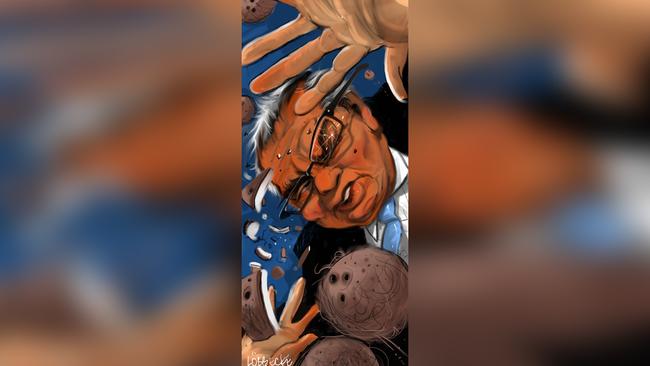
The road to revolution is paved with purges. Minority fundamentalists have taken to denouncing dissenters as “race traitors”. Indigenous, black and Asian people who want more than minority status are called Uncle Toms or coconuts, or branded with other modern variants of the scarlet letter. The torrent of hatred is excused by bigots, black and white, as long as the bigotry conforms to fashionable orthodoxy on race.
When business adviser and indigenous leader Warren Mundine was called an Uncle Tom online recently, I recalled the other vile term commonly used to disparage indigenous and black freethinkers: coconut. I heard it for the first time at a dinner party with university colleagues. We were discussing the direction of indigenous studies in Australia and I suggested that Marcia Langton’s work provided an interesting counterpoint to cultural relativism in the academic literature on violence against indigenous women and children. A colleague shut down the discussion with three little words and a sneer: “She’s a coconut.” I didn’t understand: “What’s a ‘coconut’?” The dinner guests — all white women — sniggered. The reply was uttered without any pause to furnish hope for redemptive shame: “Brown on the outside, white on the inside.”
Political commentator and Fox News contributor Michelle Malkin drew attention to the newer forms of racism directed at freethinkers from culturally diverse groups. As a woman with Filipino heritage who leans right of centre, Malkin has experienced left-wing racism first-hand. She recounts being called a “white man’s puppet”, “Tokyo Rose”, “Manila whore”, “banana, coconut and Oreo”. She returned fire recently by compiling a list of prominent conservatives and independent thinkers accused of being “an ‘Uncle Tom’ or some other vitriolic variation on the overplayed left-wing theme of being a traitor to their race or gender”.
As I wrote in 2015, PC bigotry enables misogynist and racist attacks to become mainstream by presenting social justice as a reasonable defence for them. Enlightenment thinker Ayaan Hirsi Ali is another victim of the vile trend. For example, left-wing activist journalist Sam Hamad described her as “a perfect little brown-skinned conduit” for the views of “white males”. The imagery is disgusting and indefensible.
Newer forms of racism often are directed at conservatives, but the general target is any freethinker who dissents from the PC line on major issues. Often, the abuse is intraracial. After indigenous woman Jacinta Price rejected activist calls to cancel Australia Day, she was subjected to racist abuse by other indigenous people. About 80 racist comments were dumped on her Facebook page, including a death threat: “How bout you f..king die a painful death u sell out cocanut (sic).”
In conversation with The Australian, Price took aim at racist abusers, saying they were likely to be “middle class” indigenous people because “bush mob just wouldn’t behave or talk in such a way”. Mundine agreed, saying he received such abuse from academics “who claim to be against racism (and) bigotry” yet use “the most bigoted racial taunts”.
Many “Uncle Toms” are successful in fields once closed to racial minorities such as academe, business, law, politics or the police force. Norman Randall was one of the first African-Americans to join the police force in his town when segregation was still enforced in some schools and restaurants. In an interview with Baltimore’s Capital Gazette, he described the hostility he received from both whites and blacks, saying of the latter: “If you were black and you joined the white establishment, you were an Uncle Tom.”
The Uncle Tom slur is racist abuse with a long history. It is based on a fictional character from the book Uncle Tom’s Cabin but became a term of derision used to ostracise black people who told unpalatable truths or eschewed the culture of low expectations.
Economist Walter Williams described the pressure brought on black academics to conform to race orthodoxy in universities and the media. In a 1997 article for Capitalism Magazine he wrote: “During the 70s and 80s, Dr Thomas Sowell and I came under scurrilous attacks for our departures from the conventional wisdom on race by the news media, campus intellectuals and members of the civil rights establishment … Carl Rowan said in his nationally syndicated column, ‘Vidkun Quisling, in his collaboration with the Nazis, surely did not do as much damage to the Norwegians as Sowell is doing to the most helpless of black Americans’.”
The nastiness of racism is offensive, but more offensive is its effect in suppressing the mastery of reason in the work of black intellectuals. There is fascinating literature demonstrating the evolution of black intellectuals through the power of public reason that cannot be understood — far less appreciated — if one side of it is suppressed. The dismissal of dissenting thought reinforces the ugly stereotype that racial minorities are incapable of independent thought and public reason.
Human enlightenment is forged in the fire of intense intellectual debate made possible by freedom of thought and speech. It is long-form argument that lays the foundations for human progress.
Fruitful rivalries in the development of black intellectual thought include Booker T. Washington and WEB Du Bois; Marcus Garvey and Du Bois; Martin Luther King and Malcolm X; Randall Kennedy and Derrick Bell. The works of King, Kennedy and Sowell surpass race politics to offer a broad vision for human advancement.
As the tide of public opinion turns against white supremacy, new forms of racism are emerging. The endless cycle of prejudice can sow despair. But hope prevails in the songlines of King: “When we allow freedom to ring — when we let it ring from every city and every hamlet … we will be able to speed up that day when all of God’s children, black men and white men, Jews and Gentiles, Protestants and Catholics, will be able to join hands and sing in the words of the old Negro spiritual, “Free at last, Free at last, Great God a-mighty, We are free at last.”



